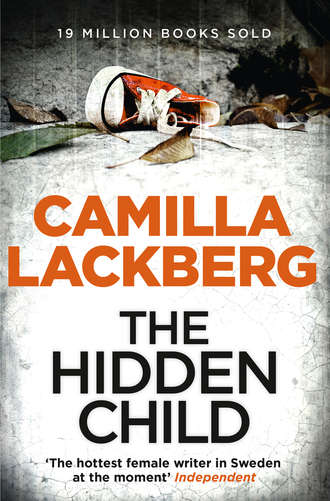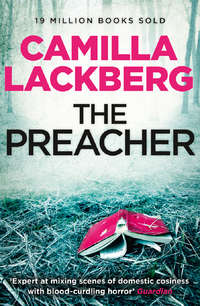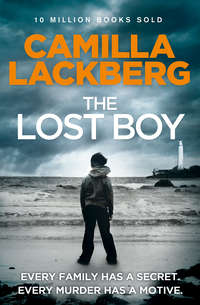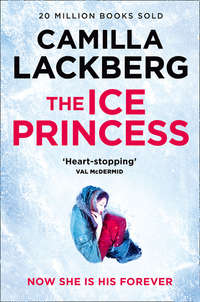
Полная версия
The Hidden Child
It was all Mellberg could do to stop himself from leaping with joy, but he paused as if considering the offer before responding, ‘Yes, thanks, that would be nice. I can’t be away from my work for very long, but …’
‘All right then.’ She punched in the door code and led the way inside. Ernst, lacking his master’s self-control, bounded forward with delight at the prospect of accompanying Señorita into her home.
The first word that occurred to Mellberg when he entered Rita’s flat was ‘comfortable’. It didn’t have that minimalist coldness that Swedes tended to favour; her place literally sparkled with colour and warmth. He unfastened the lead, and Ernst raced off after Señorita. Mellberg hung up his jacket, removed his shoes and set them neatly on the shoe rack before following Rita’s voice out to the kitchen.
‘They seem to like each other.’
‘Who?’ said Mellberg stupidly, his brain preoccupied with the sight of Rita’s marvellously ample behind, which was turned towards him as she stood at the counter measuring the coffee into the coffee-maker.
‘Señorita and Ernst, of course.’ She turned around and laughed.
Mellberg laughed with embarrassment. ‘Oh, yes, of course. They do seem to like each other, don’t they?’ A glance towards the living room confirmed this: Ernst was in the process of sniffing under Señorita’s tail.
‘Do you like buns?’ asked Rita.
‘Does Dolly Parton sleep on her back?’ asked Mellberg rhetorically, immediately regretting his choice of words. Rita turned towards him, a quizzical look on her face.
‘I don’t know. Does she? Well, with those breasts, I suppose she does.’
Mellberg laughed. ‘It’s just an expression. What I mean is, I love buns.’
He watched with surprise as she set three cups and three plates on the kitchen table. The mystery was solved when Rita turned to the room next to the kitchen and called: ‘Johanna, time for coffee!’
‘Coming!’ they heard from the other room, and a second later a ravishing blonde with an enormous stomach came into the kitchen.
‘This is my daughter-in-law, Johanna,’ said Rita, gesturing at the very pregnant young woman. ‘And this is Bertil. He’s the owner of Ernst. I met him walking in the woods,’ she said with a giggle. Mellberg held out his hand to introduce himself, and the next instant almost fell to his knees in pain. He’d shaken hands with a few tough customers over the years but never experienced a handshake as powerful as Johanna’s.
‘That’s quite a grip you have,’ he squeaked as she released his hand.
Johanna regarded him with amusement before sitting down at the kitchen table. It took her a moment to find a position that allowed her to reach both her cup and the plate holding the buns, but then she launched into the refreshments with gusto.
‘When are you due?’ asked Mellberg politely.
‘Three weeks,’ she replied curtly, intent on finishing every last crumb. Then she reached for another bun.
‘I see that you’re eating for two,’ said Mellberg and laughed, but a surly look from Johanna silenced him. Not an easy chick to flirt with, he realized.
‘It’s my first grandchild,’ said Rita proudly, patting Johanna’s stomach tenderly. Johanna’s face lit up when she looked at her mother-in-law, and she placed her own hand on top of Rita’s belly.
‘Do you have any grandchildren?’ asked Rita after filling the coffee cups and joining them at the table.
‘No, not yet. But I do have a son. His name is Simon, and he’s seventeen,’ Mellberg said proudly. The son had arrived late in his life, and the news of his existence was not something that he’d received with much enthusiasm. But they’d gradually grown accustomed to each other, and now he was constantly amazed by his feelings for Simon. He was a good lad.
‘Seventeen? Well, there’s no rush, then. But let me tell you, grandchildren are life’s dessert.’ She patted Johanna’s stomach again.
They drank their coffee and chatted pleasantly while the dogs padded about the flat. Mellberg was fascinated by the pure and genuine joy he felt just sitting in Rita’s kitchen. After all the disappointments he’d suffered in recent years, he thought he’d never want to see another woman. Yet here he was. And he was enjoying himself.
‘So, what do you think?’ Rita was staring at him, and he realized that he’d missed the question that now demanded an answer.
‘Sorry?’
‘I was asking whether you’d like to come to my salsa class tonight. It’s for beginners. Not difficult at all. At eight o’clock.’
Mellberg looked at her in disbelief. Salsa class? Him? What a perfectly ridiculous idea. But then he happened to look a little too deep into Rita’s dark eyes, and to his astonishment he heard himself saying:
‘Salsa class? Eight o’clock? Great.’
Erica was already starting to regret her decision as she walked up the gravel path towards the house belonging to Erik and Axel. It no longer seemed such a good idea, and it was with much hesitation that she raised her fist to knock on the door. At first there was no response, and she was relieved to think that nobody was at home. Then she heard footsteps inside, and her heart sank as the door opened.
‘Yes?’ Axel Frankel looked worn out. He gave her a puzzled look.
‘Hi, I’m Erica Falck, and I …’ She paused, not knowing how to go on.
‘Elsy’s daughter.’ Axel’s weariness seemed to disappear as he studied her with an odd look in his eyes. ‘Yes, I can see it now. You’re very much alike, you and your mother.’
‘We are?’ said Erica, surprised. No one had ever said that before.
‘Yes, there’s something about your eyes. And your mouth.’ He tilted his head and seemed to take in every detail of her appearance. Then he stepped aside. ‘Come in.’
Erica went into the entry hall and stopped.
‘Come this way – we’ll go and sit on the veranda.’ He strode off, apparently expecting Erica to follow. She hung up her coat and hurried to catch up. He motioned her to a sofa in a beautiful glassed-in veranda similar to the one that she and Patrik had in their home.
‘Have a seat.’
They sat there for a while in silence. Realizing that he wasn’t going to offer her coffee, Erica cleared her throat and said: ‘Well, the reason that I …’ She started over. ‘The reason that I stopped by was that I left a medal with Erik.’ She could hear how brusque that sounded and added: ‘Oh, of course I wanted to offer you my condolences. I …’ Growing more uncomfortable by the minute, she fidgeted as she searched for a way to continue.
Axel dismissed her obvious embarrassment with a wave of his hand and said in a friendly voice: ‘You were saying something about a medal.’
‘Yes, that’s right,’ said Erica, grateful that he’d taken charge. ‘This past spring I found a medal among my mother’s belongings. A Nazi medal. I didn’t know why she’d kept it and I was curious. And since I knew that your brother …’ She shrugged.
‘Was Erik able to help you?’
‘I don’t know. That is, we spoke on the phone in the spring, but then I got really busy and, well … I was planning to contact him again, but …’ Her words faded away.
‘And now you’re wondering if it’s still here?’
Erica nodded. ‘Yes. I’m sorry. It sounds so awful that I’m bothering you about it right now when … But my mother hadn’t kept very many things, so …’ She fidgeted again. She really should have phoned instead. This felt so cold-blooded.
‘I understand. I really do understand. Believe me, I of all people know how important it is to have ties to the past. Even if those ties are based on inanimate objects. And Erik would definitely have understood, considering all the things he collected, all the facts. For him they weren’t dead. They were alive, told a story, taught us something …’ He stared through the glass panes and for a moment seemed to be somewhere far away. Then he turned to Erica again.
‘Of course I’ll look for it. But first tell me a little more about your mother. What was she like? What was her life like?’
Erica found these questions rather strange. But seeing Axel’s pleading eyes she tried her best to answer.
‘Hmm … what was my mother like? To be honest, I don’t really know. Mamma was older when she had me and my sister, and … I don’t know … we never had a very good relationship with her. As for her life …’ Erica was confused by the question. Partly because she didn’t fully understand what he wanted to know, and partly because she didn’t know what to say.
‘I think she had rather a hard time of it. With life, I mean. She was always so reserved. To me, she never seemed … happy.’ Erica struggled to find a better way to explain, but that was as close to the truth as she could get. She couldn’t recall ever seeing her mother happy.
‘I’m sorry to hear that.’ Axel again gazed out of the window, as if he couldn’t bear to look at Erica. She wondered why he was asking her these questions.
‘What was my mother like when you knew her?’ Erica couldn’t disguise the eagerness in her voice.
Axel turned towards her, and his face seemed to soften. ‘It was actually my brother who was friends with Elsy, since they were about the same age. But they were part of a foursome: Erik, Elsy, Frans, and Britta. A real four-leaf clover.’ He laughed, a strangely joyless laugh.
‘Yes, she wrote about them in the diaries that I found. I know about your brother, but who were Frans and Britta?’
‘Diaries?’ Axel gave a start of surprise, but it came and went so quickly that a second later Erica thought she must have imagined his reaction. ‘Frans Ringholm and Britta …’ Axel snapped his fingers. ‘Now what was Britta’s last name?’ He closed his eyes as if searching the dark recesses of his memory but shook his head, unable to find the information. ‘Anyway, I think she still lives here in Fjällbacka. She has daughters – two or three, I’m not sure – but they’re quite a bit older than you. Hmm … it’s on the tip of my tongue, but … She probably changed her name when she got married. Wait, now I remember. Her last name was Johansson, and she married a man also named Johansson, so she didn’t have to change her name after all.’
‘So I should be able to find her. But you didn’t answer my question. What was my mother like? Back then.’
Axel was silent for a long time, then he said: ‘She was a quiet girl. Contemplative, but never gloomy. Not the way you describe her. She had a quiet joy about her that came from inside. Nothing like Britta.’ He snorted.
‘So what was Britta like?’
‘I never really liked her. I couldn’t understand why my brother wanted to spend time with such a … silly goose.’ Axel shook his head. ‘No, your mother was a very different sort of girl. Britta was shallow and superficial, and she kept running after Frans in a way that … girls just didn’t do back then. Those were different times, you know.’ He gave Erica a wry smile and winked.
‘So what about Frans?’ Erica was staring at Axel open-mouthed, ready to take in all the information that he had about her mother. The more she found out, the more she realized how little she’d known her mother.
‘Frans Ringholm was someone else I didn’t think my brother should spend time with. A fierce temper, a mean streak, and … no, he’s not the sort you should be friends with. Then or now.’
‘What does he do now?’
‘He lives in Grebbestad. And you might say that he and I have taken different paths in life.’ Axel’s tone of voice was filled with contempt.
‘How do you mean?’
‘I mean that I’ve devoted my life to fighting Nazism, while Frans would like to see history repeat itself, and preferably here on Swedish soil.’
‘So how does the Nazi medal that I found come into the picture?’ In her eagerness, Erica leaned towards Axel, but it was as if his face suddenly closed.
‘Ah, that’s right, the medal …’ he said, getting to his feet and moving quickly towards the door. ‘I think we should go and look for it.’
As she followed, Erica wondered what she’d said to make him shut down like that, but she decided it wasn’t the right time to ask. Out in the hall she saw that Axel had stopped in front of a door that she hadn’t noticed before. The door was closed, and he hesitated, his hand on the knob.
‘I think I’d better go in alone,’ he said, his voice quavering slightly. Erica realized they must be standing outside the library, the room where Erik had died.
‘We can do this some other time,’ she said, again feeling guilty for disturbing Axel in his bereavement.
‘No, we’ll do it now,’ he said brusquely. Then he repeated his words, this time in a gentler tone, as if to show that he hadn’t meant to sound so harsh.
‘I’ll be right back.’ He opened the door, stepped inside, and then closed the door behind him. Erica stayed in the hall, listening to Axel rummaging about inside. It sounded as though he was pulling out drawers, and he must have found what he was looking for very quickly because it took only a minute or two before he came out.
‘Here it is.’ With an inscrutable expression, he put the medal in Erica’s outstretched hand.
‘Thank you. I …’ At a loss for words, she simply closed her fingers around the medal and repeated ‘Thanks.’
As she walked along the gravel path with the medal in her pocket, she could feel Axel’s eyes watching her. For a moment she considered going back to apologize for bothering him, but then she heard the sound of the front door closing.
CHAPTER 10 FJÄLLBACKA 1943
‘I don’t understand how Per Albin Hansson can be such a coward!’ Vilgot Ringholm slammed his fist on the table, making the cognac decanter jump. He’d told Bodil to bring out the supper-time snacks, and he wondered what was taking her so long. How typical of the woman, dawdling like that. Nothing ever got done properly unless he did it himself.
‘Bodil!’ he shouted in the direction of the kitchen, but there was no response. He knocked the ash from his cigar and shouted again, bellowing at the top of his lungs, ‘Bodillll!’
‘Did the missus lose her way out in the kitchen?’ joked Egon Rudgren, and Hjalmar Bengtsson joined in the laughter. That made Vilgot even angrier. Now the woman was making him look a fool in front of his presumptive business partner. Something had to be done. But just as he was about to get up and find out what was going on, his wife came in from the kitchen, carrying a fully laden tray in her hands.
‘I’m sorry it took so long,’ she said, her eyes lowered as she placed the tray on the table in front of them. ‘Frans, could you …?’ She motioned towards the kitchen, but Vilgot waved the boy back.
‘I won’t have Frans in the kitchen, fussing with women’s work. He’s a big boy now, and he can stay here with us and learn a thing or two.’ He winked at his son, who sat up straight in the armchair across from him. This was the first time he’d been allowed to linger on in the room after one of his father’s business dinners. Usually he was expected to excuse himself as soon as they finished eating and retreat to his room, but today his father had insisted that he stay. Pride swelled his chest until it seemed the buttons would fly off his shirt and scatter in every direction. And the evening was about to get even better.
‘All right, my boy, how about tasting a few drops of cognac? What do you gentlemen think? He turned thirteen this week. Isn’t it about time the boy tasted his first cognac?’
‘About time?’ laughed Hjalmar. ‘I’d say it was long overdue. My boys got their first taste when they were eleven, and it did them good, let me tell you.’
‘Vilgot, do you really think …’ Bodil watched disconsolately as her husband deliberately poured a big glass of cognac and handed it to Frans, who started coughing at the first swallow.
‘All right, lad, take it easy – it should be sipped, not gulped.’
‘Vilgot …’ said Bodil again.
‘Why are you still here?’ snarled Vilgot, his face darkening. ‘Don’t you have things to clean up in the kitchen?’
For a moment it looked as if Bodil meant to say something. She turned to Frans, but he merely raised his glass triumphantly and said with a smile: ‘Skål, my dear mother.’
To the sound of roaring laughter she went back to the kitchen, closing the door behind her.
‘Now where was I?’ said Vilgot, motioning for his guests to help themselves to the herring sandwiches on the silver tray. ‘Oh, right, what can Prime Minister Per Albin be thinking? Of course we must offer Germany our support!’
Egon and Hjalmar nodded. Naturally, they were in full agreement.
‘It’s deplorable,’ said Hjalmar, ‘that in these difficult times Sweden can’t stand tall and uphold Swedish ideals. It almost makes me ashamed to be Swedish.’
All the men nodded and sipped their cognac.
‘What am I thinking? We can’t sit here drinking cognac with the herring. Frans, go downstairs and fetch us some cold pilsners.’
Five minutes later order was restored, and the herring sandwiches could be washed down with big gulps of Tuborg beer, chilled from the cellar. Frans was again sitting in the armchair across from his father, and he smiled from ear to ear when Vilgot, without comment, opened one of the bottles and handed it to him.
‘I’ve contributed a krona or two to support the good cause. And I’d suggest that you gentlemen do the same. Hitler needs all the good men that he can get on his side right now.’
‘Business is certainly booming,’ said Hjalmar, raising his bottle. ‘We can hardly keep up with the export demand for all the ore. Say what you like about the war, from a business perspective, it’s not a bad idea.’
‘You’re right about that. And if we can get rid of those miserable Jews at the same time, so much the better.’ Egon reached for another herring sandwich. By now there were only a few left. He took a bite and then turned to Frans, who was listening intently to everything that was said. ‘You should be proud of your father, boy. There aren’t many like him in Sweden these days.’
‘Yes, sir,’ mumbled Frans, suddenly embarrassed by the attention directed at him.
‘Listen to what your father says, and ignore all those morons who condemn the Germans and the war. Most of them are mixed-breeds, you know. There are a lot of gypsies and Walloons hereabouts, and naturally they’re out to twist the facts. But your father, he knows what’s what. And we do too. We’ve all seen how the Jews and the foreigners have tried to take over, doing their damnedest to destroy what’s Swedish and pure. No, Hitler is on the right track, you mark my words.’ Egon was all fired up, breadcrumbs flying out of his mouth. Frans was spellbound.
‘I think we should talk business now, gentlemen.’ Vilgot set his bottle of beer down on the table with a bang and all eyes turned to him.
Frans sat there listening to the men for another twenty minutes. Then he stood up unsteadily and went to bed. It felt as if the whole room was spinning as he lay down, fully clothed. From the parlour he could hear the low drone of the men talking. As Frans drifted off to sleep, he was blissfully unaware of how he was going to feel when he woke up.
CHAPTER 11

Gösta sighed deeply. Summer was about to be replaced by autumn, and in practical terms this meant that his rounds of golf would soon be drastically curtailed. It was still quite warm, and in theory he had about a month’s worth of playing. But he knew from bitter experience how it would go. A couple of games would be rained out. Another couple would be cancelled due to thunderstorms. And then from one day to the next the temperature would plunge from pleasant to intolerable. That was the disadvantage of living in Sweden. And he couldn’t see too many advantages that made up for it, aside from the availability of surströmming, the fermented Baltic herring that was his favourite delicacy. But if he moved abroad he could just take a couple of jars in his suitcase. Then he’d have the best of both worlds.
At least things were calm at the police station. Mellberg was out taking Ernst for a walk, and Martin and Paula had gone to Grebbestad to interview Frans Ringholm. Gösta wondered again why the name seemed so familiar, and to his great relief, something clicked in his brain. He snatched up that day’s edition of Bohusläningen from his desk and looked through it until he triumphantly set his finger on the name – Kjell Ringholm. The newspaper’s irascible columnist was the scourge of local politicians and anyone else in power. Could be a coincidence, but it wasn’t a common surname. Frans’s son perhaps? Gösta filed away the information in his mind, in case it might prove useful later on.
For the moment, he had more pressing things to deal with. He sighed again. Over the years he’d made sighing into an art form. Maybe he should wait until Martin came back, that way he’d be able to share the workload. Better still, it would give him an hour to himself, maybe two if Martin and Paula decided to stop for lunch before heading back to the station.
But on second thought he decided it might be better to get it out of the way instead of having it hanging over him. Gösta grabbed his jacket, told Annika where he was off to, took one of the cars from the garage, and headed for Fjällbacka.
Not until he rang the doorbell did it occur to him what a stupid decision he’d made. It was just past noon: the boys would be in school. He was just about to leave when the door opened and a snuffling Adam appeared, his nose red and his eyes glazed.
‘Are you sick?’ Gösta asked.
The boy nodded, and as if corroboration were necessary, he sneezed loudly and then blew his nose on the handkerchief he was holding. ‘I’ve got a cold,’ he said, in a voice that clearly demonstrated how stuffed up his nose was.
‘May I come in?’
Adam stepped aside. ‘Okay, but it’s at your own risk,’ he said, sneezing again.
Gösta felt a light shower of virus-bearing saliva strike his hand, which he calmly wiped on the sleeve of his shirt. A couple of days sick leave wouldn’t be so bad. He’d gladly suffer a runny nose if he could stretch out on the sofa at home and watch a DVD of the latest Masters tournament. He had been waiting for a chance to study Tiger’s swing in slow motion.
‘Babba isn’t ’obe,’ Adam snuffled.
Gösta frowned as he followed the boy into the kitchen. Then he worked it out. Adam must have meant to say ‘Mamma isn’t home.’ It crossed Gösta’s mind that he shouldn’t really be interviewing a minor without a legal guardian present, but he quickly dismissed the thought. Had Ernst been here, he would have given Gösta his full support – as in Ernst his former colleague, rather than the dog. Gösta chuckled at that, drawing a puzzled look from Adam.
They sat down at the kitchen table, which still bore traces of that morning’s breakfast: breadcrumbs, dabs of butter, and a little puddle of O’Boy chocolate drink.
‘So,’ said Gösta, drumming his fingers on the table and instantly regretting it when his fingers came away covered in sticky crumbs. He wiped them on his trousers and started again.
‘So. How … are you taking this whole thing?’ The question sounded odd even to him. He wasn’t particularly good at talking with kids or with so-called traumatized people. Not that he really went along with any of that nonsense. Good Lord, the old man was dead when they found him, so how bad could it have been? He’d seen a few stiffs in his years on the force, and it had never made him feel traumatized.
Adam blew his nose and then straightened his shoulders. ‘Er, okay, I suppose. Everybody at school thinks it’s cool.’
‘How did the two of you happen to go there in the first place?’
‘It was Mattias’s idea.’ Adam mumbled the name, but by now Gösta was used to the way the boy’s cold was affecting his speech, and he could decipher what he said.
‘Everybody around here knows that those old guys are weirdos who are obsessed with World War II and stuff like that, and somebody at school said they had a load of cool stuff at their house, so Mattias thought we should go in and check it out …’ His torrent of words was suddenly cut off by such a big sneeze that Gösta actually jumped.







